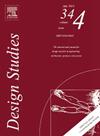从眼睛的伦理到身体的伦理:通过感官实践反思设计研究中的伦理问题
IF 3.2
1区 工程技术
Q2 ENGINEERING, MANUFACTURING
引用次数: 0
摘要
在本文中,我们提出了我们所描述的 "身体伦理",即设计研究人员和设计专业学生如何通过身体反思来处理伦理问题。通过对比 "眼睛的伦理学 "和身体的伦理学,我们认为,在进行设计研究时,将感官实践作为一种伦理学方法来开发和使用是有好处的,这样可以在现场处理伦理学问题,并反映可能难以把握的伦理学层面。基于对两个设计研究项目经验实例的分析,本文为设计研究人员和设计教育专业的学生提供了一种方法,即如何通过发展身体伦理学,从方法论上激活伦理学的感官方法。本文章由计算机程序翻译,如有差异,请以英文原文为准。
From an ethics of the eyes to ethics of the bodies: Rethinking ethics in design research through sensory practices
Within this paper, we develop what we describe as an ethics of the bodies, which operationalises how design researchers and design students can deal with ethics through embodied reflections. Contrasting an “ethics of the eyes” and an ethics of the bodies, we argue that there are benefits when developing and using a sensory practice as an ethical approach when conducting design research in order to deal with ethics in situ and reflecting ethical dimensions that can be slippery to grasp. Based on an analysis of two empirical examples from design research projects, the paper contributes an approach for how design researchers, and students in design education, can work methodologically to activate a sensory approach to ethics by developing an ethics of the bodies.
求助全文
通过发布文献求助,成功后即可免费获取论文全文。
去求助
来源期刊

Design Studies
工程技术-工程:制造
CiteScore
8.60
自引率
20.00%
发文量
41
审稿时长
40 days
期刊介绍:
Design Studies is a leading international academic journal focused on developing understanding of design processes. It studies design activity across all domains of application, including engineering and product design, architectural and urban design, computer artefacts and systems design. It therefore provides an interdisciplinary forum for the analysis, development and discussion of fundamental aspects of design activity, from cognition and methodology to values and philosophy.
Design Studies publishes work that is concerned with the process of designing, and is relevant to a broad audience of researchers, teachers and practitioners. We welcome original, scientific and scholarly research papers reporting studies concerned with the process of designing in all its many fields, or furthering the development and application of new knowledge relating to design process. Papers should be written to be intelligible and pertinent to a wide range of readership across different design domains. To be relevant for this journal, a paper has to offer something that gives new insight into or knowledge about the design process, or assists new development of the processes of designing.
 求助内容:
求助内容: 应助结果提醒方式:
应助结果提醒方式:


